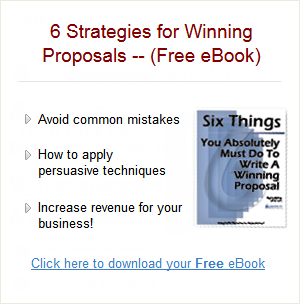Eight Steps to a Winning Proposal
Your proposal can lose for a whole lot of reasons. Some are out of your control. Most proposers, however, carry their fates in their own hands; whether they win or lose depends in great part on how they conduct their proposal writing activities.
Over the years I have found that there are certain key elements in preparing winning proposals. Here are my top eight:
Open and sustain a dialog with the client.Establish early client contact to find out as much as you can about his needs and how you can help meet them. But make sure you don’t let it languish by not carrying on the dialog.
Listen to the client, and come up with possible solutions. Then go back and listen some more. The better the dialog, the more the client will view you as helping him solve his problem.
Show the client your ideas as they evolve. A client will always be more favorably inclined to a proposal that includes an approach he is already familiar with. In your on-going dialog with the client you need to be showing him your approach to resolving his problem, getting his feedback, and improving it. When he sees it in the proposal he will be familiar with it.
Make sound go/no-go decisions. Winning proposals require solid go/no-go decisions based on close scrutiny of facts about your client, your competition, and yourself. Don’t make go/no-go decisions based on gut instinct. You may win once in a while, but chances are good you’ll lose more than you win.
Differentiate yourself from your competitors. Here’s a fact: most firms in any given competition are equally capable of doing the work the client wants done. The winning firm will cast its approach in such a way as to create the perception that its approach is unique. You need to find ways to do this.
Identify your specific competitors early. If you know who your competitors are, you can identify their strengths with respect to this proposal opportunity, and then figure out ways you can neutralize them in your proposal. Once you have determined the competition’s strengths, come up with ways your firm matches or exceeds each perceived strength.
Call out the direct and specific benefits of your approach to the client. It’s not enough to stress the strengths of your approach or your project team. You must also point out in specific terms just how your strengths translate into direct benefits to the client. Make sure that these benefits are clear; this lets your proposal stand out above the rest of the competition.
Commit 100% to writing the proposal. If you want to win, you must commit yourself to the kind of effort it really takes to win. Dedicate the necessary people to the proposal, even if it means taking them off billable work. Get your subs involved from the beginning. And plan the effort from the start, to make sure everyone’s time is used wisely.
Get started early. The best way to win is to start early. If you wait until the last possible moment, you will probably lose. To put it another way, if you wait, don’t write the proposal. You can bet someone out there has got the jump on you.

